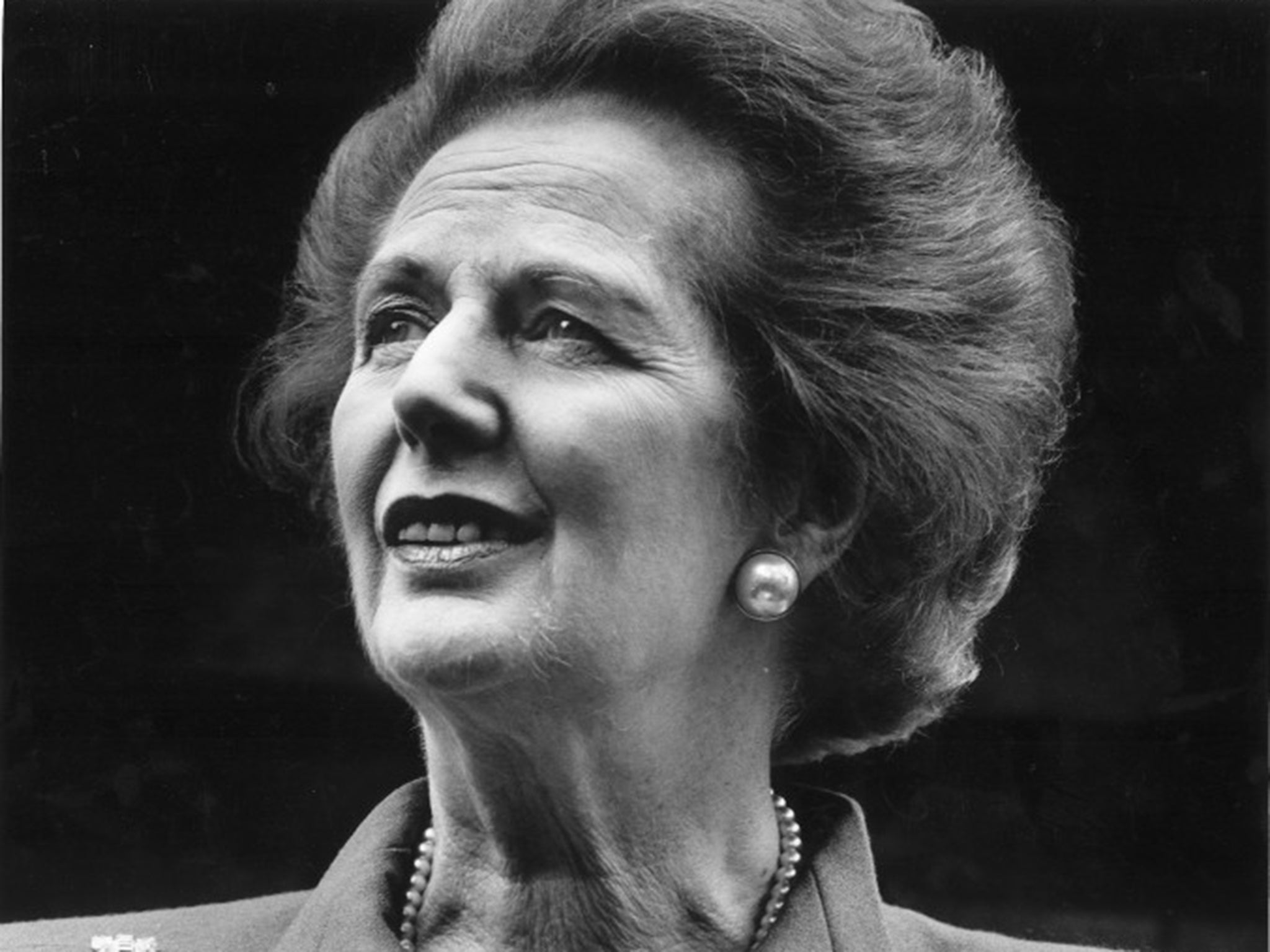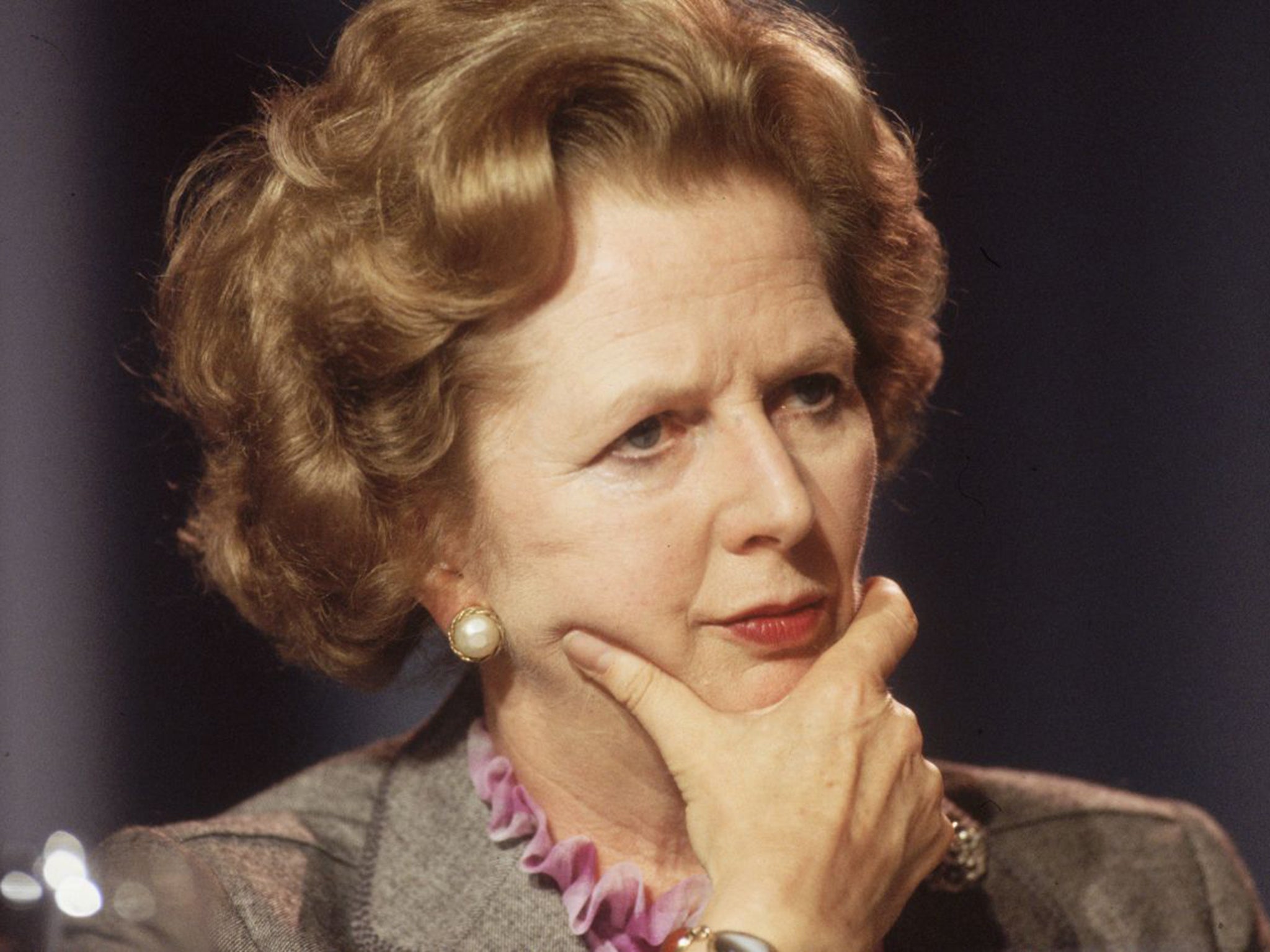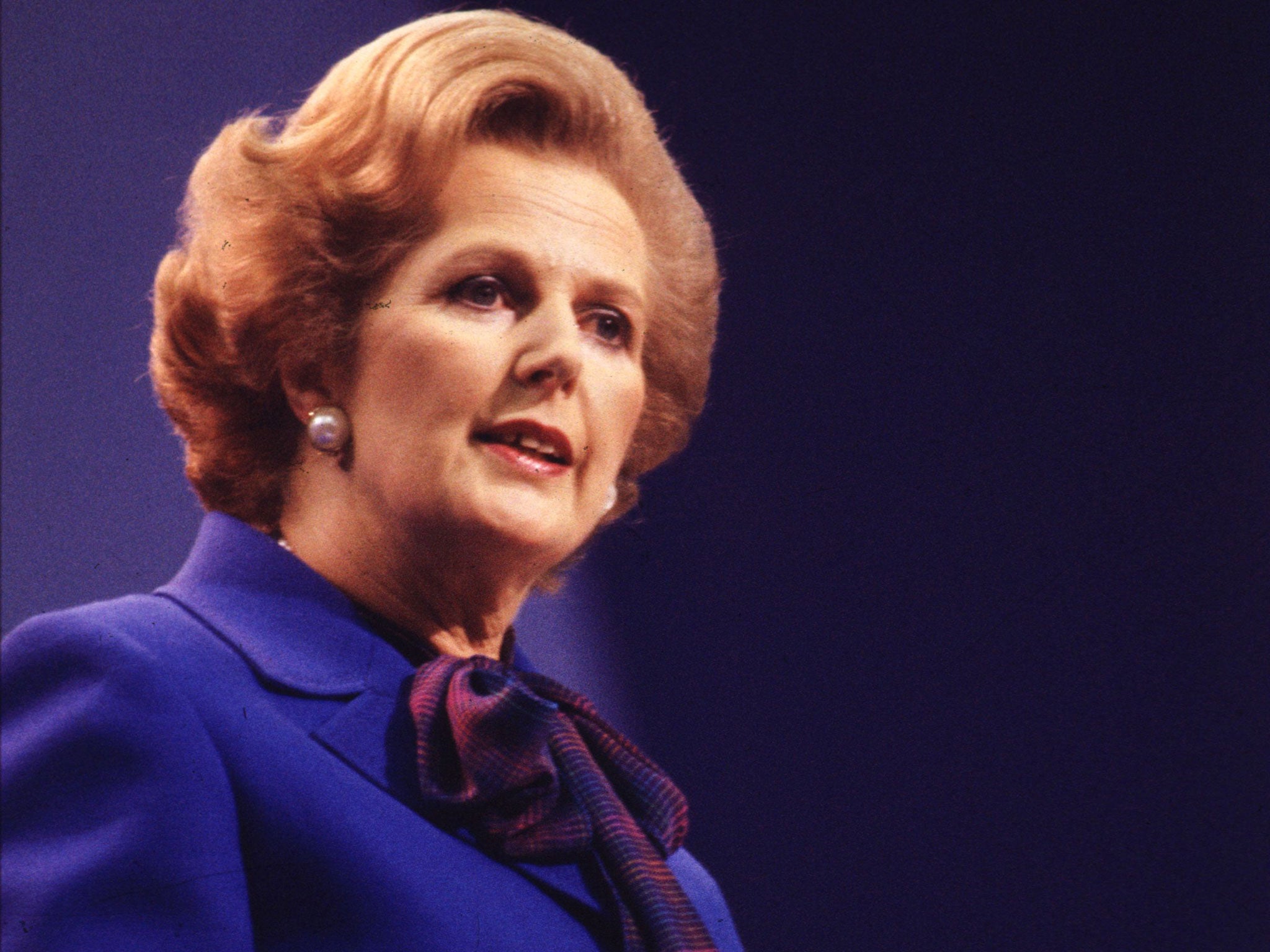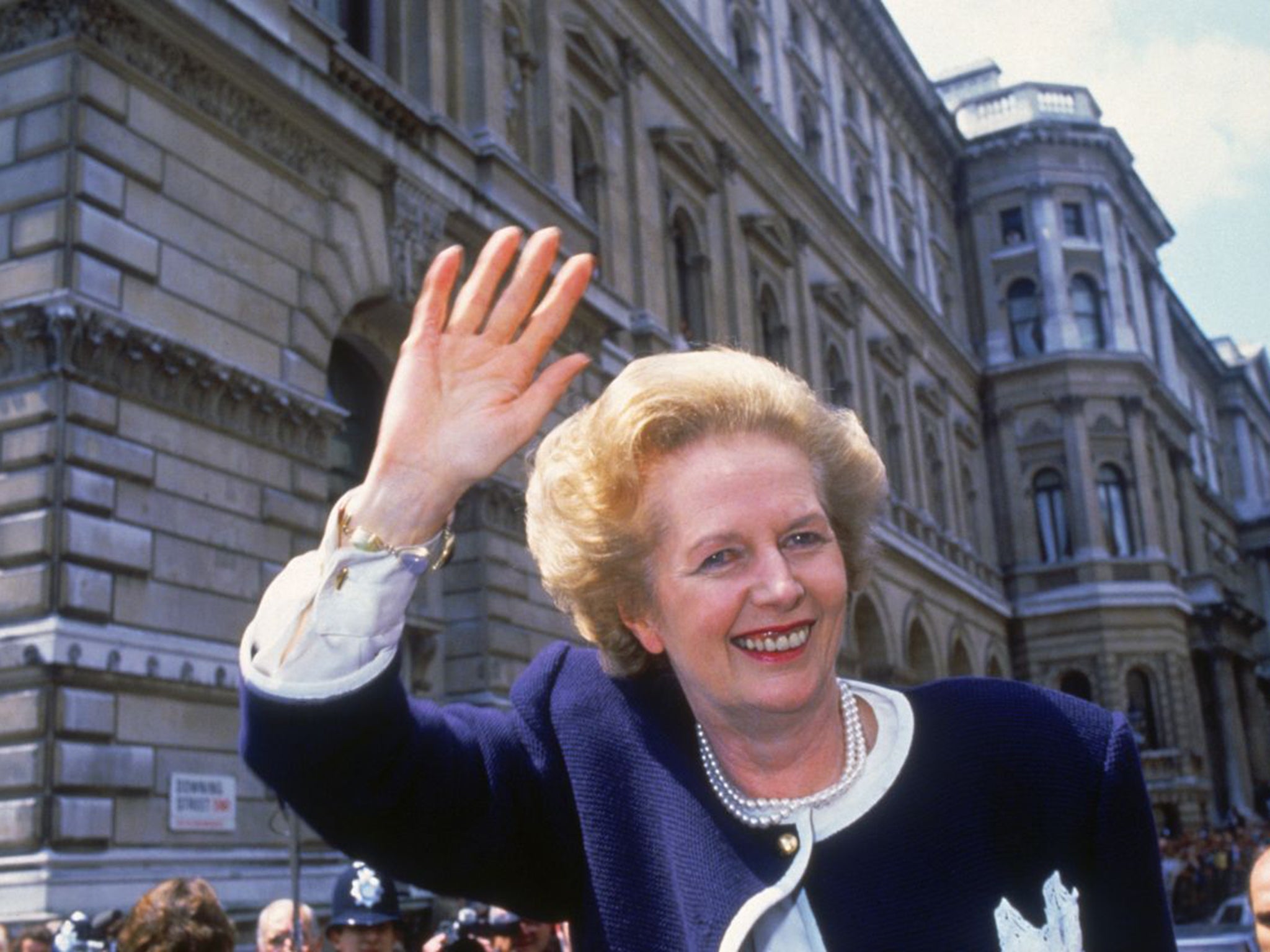Margaret Thatcher: A new book explores the Iron Lady's religious faith, and reveals how she modelled herself on Joan Crawford
God & Margaret Thatcher shows how she transformed the spiritual, cultural and political life of Britain, for better or worse

Your support helps us to tell the story
From reproductive rights to climate change to Big Tech, The Independent is on the ground when the story is developing. Whether it's investigating the financials of Elon Musk's pro-Trump PAC or producing our latest documentary, 'The A Word', which shines a light on the American women fighting for reproductive rights, we know how important it is to parse out the facts from the messaging.
At such a critical moment in US history, we need reporters on the ground. Your donation allows us to keep sending journalists to speak to both sides of the story.
The Independent is trusted by Americans across the entire political spectrum. And unlike many other quality news outlets, we choose not to lock Americans out of our reporting and analysis with paywalls. We believe quality journalism should be available to everyone, paid for by those who can afford it.
Your support makes all the difference.Margaret Thatcher sat in the dark of the theatre watching Evita, mesmerised. Here was a show about a woman who made the people of her country love her so much she had to tell them not to cry for her. Could she achieve as much?
“It was a strange and wondrous evening, leaving so much to think about,” she wrote to the speech-writer who had taken her to see the new musical in the summer of 1978. “I still find myself rather disturbed by it.”
She was still only leader of the opposition at the time. As Mrs Thatcher sat and listened to David Essex sing about politics being a circus, there were some who thought the idea of a female prime minister was a joke. Yet the scale of her ambition was vast, as revealed in a new book that quotes the private letter and her thoughts on the followers of Eva Peron.

“If they can do that without any ideals, then if we apply the same perfection and creativeness to our message, we should provide quite good historic material for an opera called ‘Margaret’ in 30 years’ time.”
Well, she did get a musical response when she died, but not quite the one she had hoped for. “Yeah, it was called ‘Ding Dong! The Witch Is Dead’” says the historian Dr Eliza Filby, laughing. That was part of the passionate, polarised reaction to Baroness Thatcher’s death in 2013: some wept in the streets, others spat on the ground and campaigned to get a scornful song from The Wizard of Oz into the charts.
Dr Filby, a historian at King’s College London, was commentating for television that day. She has now published God & Margaret Thatcher, a meticulously-researched account of the beliefs that shaped the Iron Lady – and how she in turn transformed the spiritual, cultural and political life of Britain, for better or worse.
The book is no polemic, but it is personal. “I was born on the night of the Brixton riots in April 1981, in nearby Tooting, where copycat disturbances prompted my father to start boarding up the front windows of my house,” writes Dr Filby. “His frantic nail-banging triggered my mother’s waters to break.”
This 34-year-old child of Thatcher worked on the book for six years, coaxing interviews out of many of the men who had served as her ministers, including Cecil Parkinson, Geoffrey Howe, Douglas Hurd, Norman Tebbit, Nigel Lawson and Kenneth Baker. Some of them will be at the launch in Church House this week.
There are still big questions to be asked, on International Women’s Day, about the most famous or infamous, most adored or reviled female political leader in history. How did she do it? Are there any lessons to be learnt for Natalie Bennett, Yvette Cooper, Theresa May and other women? (Not to mention the men who continue to lead our main parties as if it were their birthright, as if Margaret Thatcher had never existed, or as if Spitting Image was right and she was secretly a man).
“I don’t think anybody of my generation sees Thatcher as a role model,” says Dr Filby, chuckling at the thought. She is in business, as well as being an academic, and is developing a female leadership course taking lessons – good and bad – from key women such as Thatcher and Angela Merkel.
There is one very big and important lesson to be learnt from Thatcher’s life, but before we get to that it is worth remembering that her tougher-than-the boys style pushed aside other women and is partly to blame for the paucity of female leaders since.
“Mrs Thatcher was queen bee. She was not very keen on promoting or furthering the careers of any women in her cabinet. She was very nice to her female servants, but the hierarchy was assured.”
She rose among leering, patronising men in the Seventies but found a way to exploit inequality for her own ends. “She put herself in a powerful position, being the only woman in the room, surrounded by public-school educated boys who didn’t like to talk back to a woman, and didn’t really know how to deal with a woman in a position of power.”
Mrs Thatcher also worked herself into the ground, making sure she knew enough to dominate those around her. “Men are intimidated by a woman in power who has all the answers. And also slightly turned on by it as well. She was brilliant at carving out an image. The problem is that she came to believe her own hype.”

The young Margaret Hilda Roberts was the daughter of a strong-willed man, Alfred Roberts: grocer, prominent local politician and mayor of Grantham, but above all a Methodist lay preacher. His daughters were forbidden to sew, play board games or even read newspapers on the Sabbath. But they did go to the movies on other nights, and Margaret loved one actress in particular.
“I think she modelled herself on Joan Crawford,” says Dr Filby. “She grew up in the Thirties, when all those movies were being made for women, starring feisty women literally banging Clark Gable on the head with their handbags. Joan Crawford was not an Establishment figure like Katharine Hepburn. She often played the angry young woman, aspirational and on the up, with her handbag.”
Surprisingly, like a Hollywood starlet in a male-dominated world, young Margaret used flirtation as a means to power. She challenged an electoral opponent to dance with her in public, which got him in a fluster. She pulled pints behind the bar of a working men’s club, believing it was the best way to meet the voters there eye to eye and charm them.
“She used her sexuality, of course she did,” says Dr Filby. “Everyone was in love with her, in a way that had ruthless sexual overtones but was also motherly as well.
“She was sexually manipulative. She knew that she could intimidate men with her sexuality.”
That became even more true as she rose up the ranks. But despite it all, she was “naive when it came to sex. To gay men in her circle she would say, ‘When are you going to find yourself a nice young lady?’”
Many of the methods she used to get ahead are of no use now, for very good reasons.
“You can’t deploy the techniques that Thatcher deployed, which were mostly based on intimidating the men around her,” says Dr Filby. “Whatever profession a woman goes into – my sister is a camerawoman, for example – she is not the only female in the room. You’ve got to have a sense of female solidarity. Companies that employ women know they are not only ticking some gender equality box, they are also more likely to make money. The economic case, as much as the moral case, for equality has been made.”

Well, almost. Different rules still seem to apply to female political leaders. “Women politicians always have to be competent. The question hangs over every female politician: ‘Are you up to the job?’ Would Natalie Bennett have been treated as badly if she had been a man? No.”
That’s arguable. It was not so much the Green leader’s faltering interview that did the lasting damage as the public slapping down she got from a (female) colleague, and the sense that the wrong woman is in charge. Caroline Lucas MP, the former leader, has some of the skill that Margaret Thatcher had in spades: the ability to embody her cause.
“Mrs Thatcher was always the vehicle for an idea. She personified it. There is a picture of her in 1979 holding up two shopping bags, one red and half empty, the other blue and full to the brim. It crystallised in one shot how neoliberal economics related to people’s everyday lives. Her strength was in converting people to the cause.”
To do that, you’ve got to have a cause in the first place. Margaret Thatcher found hers in a particularly strict kind of Christianity. Her father emphasised that religion was all about the individual’s relationship with God, and said churches who got involved in social issues were being distracted from the Gospel.
She quoted St Francis on the steps of No 10, thanks to the speechwriter who took her to see Evita, but never saw herself as being on a mission from God, as Ronald Reagan did. “That language would have made no sense to her. She would have said, ‘I have a duty to serve, and in doing so I am serving God.’”
For better or worse, she was the ultimate conviction politician, convinced that her moral values gave her a way to make the world better. The idea (inspired by John Wesley) was that if you gave people freedom to become prosperous, they would save more and give more. They would realise their obligations and be kind to those worse off.
It didn’t work like that, as Britain boomed and greed became good. She was baffled, suggests Dr Filby, who believes rather surprisingly that Margaret Thatcher had too much faith in the goodness of humanity. “When she said there was ‘no such thing as society’ it was not a negative or flippant statement but an optimistic rallying cry for individual moral responsibility to oneself and to one another.”
Asked by Frank Field MP to name her greatest regret in office, Mrs Thatcher apparently said it was not taxing the rich enough: “I cut taxes and I thought we would get a giving society, and we haven’t.”
Thatcherism failed. Blairism failed after that. Politics seems to be failing, as an election looms. We’re left with dead-eyed leaders reciting empty words to voters who don’t believe anything they say. But there is still one thing they could learn from Margaret Thatcher – give us something to believe in.
She may have done real and lasting damage, but the new book reveals the extent to which faith convinced Margaret Thatcher she could and should make the world a better place. Maggie really meant it and people responded. That was her greatest gift, says the author. “If politics is all cosmetic, women should be good at it. Historically, it is what we have been told to do: ‘Be a clothes horse, look good, sell something! Cigarettes. Sex. Anything!’ The great thing about Margaret Thatcher was that she sold something she believed in.”
‘God & Mrs Thatcher’ is published by Biteback, £16
Join our commenting forum
Join thought-provoking conversations, follow other Independent readers and see their replies
Comments